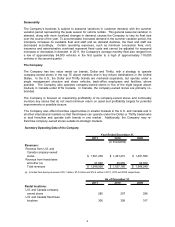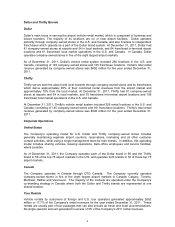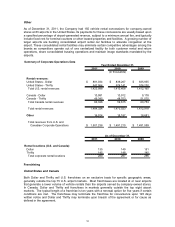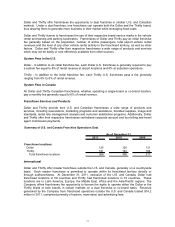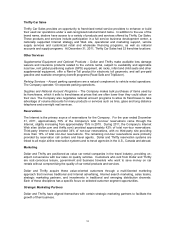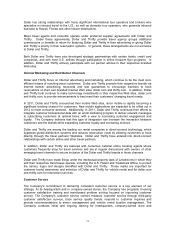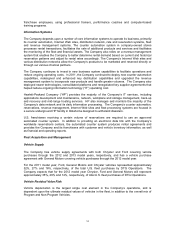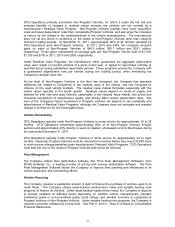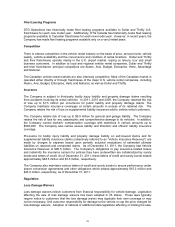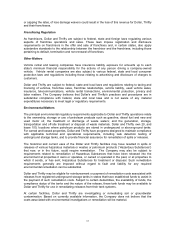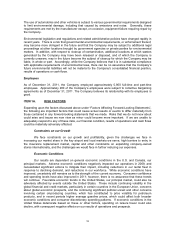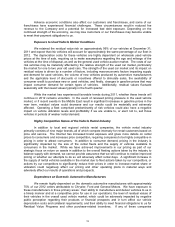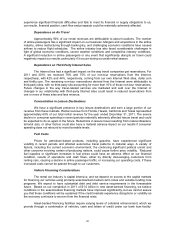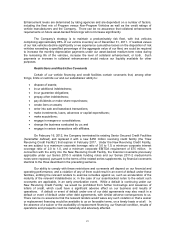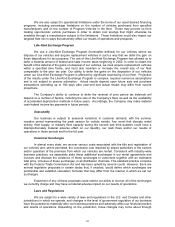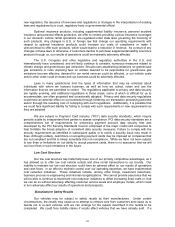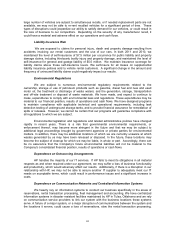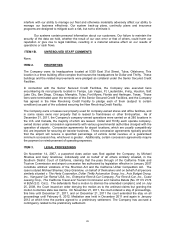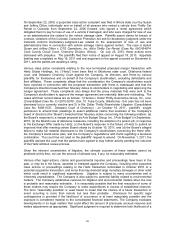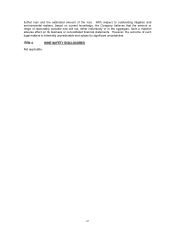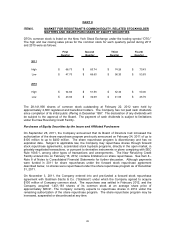Thrifty Car Rental 2011 Annual Report Download - page 20
Download and view the complete annual report
Please find page 20 of the 2011 Thrifty Car Rental annual report below. You can navigate through the pages in the report by either clicking on the pages listed below, or by using the keyword search tool below to find specific information within the annual report.
The use of automobiles and other vehicles is subject to various governmental requirements designed
to limit environmental damage, including that caused by emissions and noise. Generally, these
requirements are met by the manufacturer except, on occasion, equipment failure requiring repair by
the Company.
Environmental legislation and regulations and related administrative policies have changed rapidly in
recent years. There is a risk that governmental environmental requirements, or enforcement thereof,
may become more stringent in the future and that the Company may be subject to additional legal
proceedings at other locations brought by government agencies or private parties for environmental
matters. In addition, with respect to cleanup of contamination, additional locations at which wastes
generated by the Company may have been released or disposed, and of which the Company is
currently unaware, may in the future become the subject of cleanup for which the Company may be
liable, in whole or part. Accordingly, while the Company believes that it is in substantial compliance
with applicable requirements of environmental laws, there can be no assurance that the Company’s
future environmental liabilities will not be material to the Company’s consolidated financial position,
results of operations or cash flows.
Employees
As of December 31, 2011, the Company employed approximately 5,900 full-time and part-time
employees. Approximately 200 of the Company’s employees were subject to collective bargaining
agreements as of December 31, 2011. The Company believes its relationship with its employees is
good.
ITEM 1A. RISK FACTORS
Expanding upon the factors discussed above under “Factors Affecting Forward-Looking Statements”,
the following are important factors that could cause actual results or events to differ materially from
those contained in any forward-looking statements that we made. Risks that we do not know about
could arise and issues we now view as minor could become more important. If we are unable to
adequately respond to any of these risks, our financial condition, results of operations and cash flows
could be materially adversely affected.
Constraints on our Growth
We face constraints on our growth and profitability, given the challenges we face in
increasing our market share in the key airport and local markets we serve, high barriers to entry in
the insurance replacement market, capital and other constraints on expanding company-owned
stores internationally, and the challenges we would face in further reducing our expenses.
Economic Conditions
Our results are dependent on general economic conditions in the U.S. and Canada, our
principal markets. Adverse economic conditions negatively impacted our operations in 2009, and
necessitated significant actions to mitigate their impact, including reductions in our rental fleet in
response to declining demand, and reductions in our workforce. While economic conditions have
improved, uncertainty still remains as to the strength of the current economy. Consumer confidence
and spending levels have also improved in 2011; however, there is no assurance that these trends
will continue. Favorable economic trends in the United States, our principal market, could also be
adversely affected by events outside the United States. These include continuing volatility in the
global financial and credit markets, particularly in certain countries in the European Union, concerns
about global economic prospects, and the continuing significant political unrest and other concerns
involving certain oil-producing countries, which has contributed to price volatility for petroleum
products, and in recent periods higher average gasoline prices, which could affect both broader
economic conditions and consumer discretionary spending patterns. If economic conditions in the
United States deteriorate based on these or other factors, spending on leisure travel could also
decline, with consequent negative effects on our results of operations and prospects.
18


